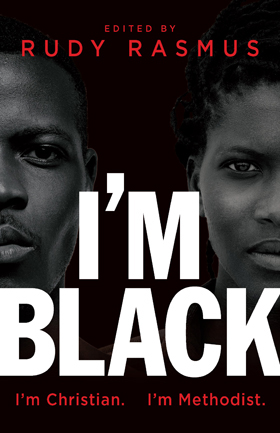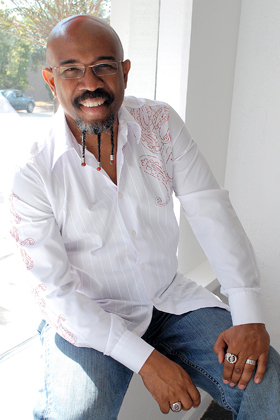Black United Methodists warn in a new book of essays that it’s critical the denomination deal with racial issues with a sense of urgency.
“I think there’s been a great deal of debate around human sexuality but no conversation, for the most part, around the part that race has played in the problems the denomination is facing,” said the Rev. Rudy Rasmus, senior pastor at St. John’s Downtown Church in Houston and editor of the book “I’m Black. I’m Christian. I’m Methodist.”
“I really think that now is the time where the conversation has to occur as to whether or not Blacks do have a future in the denomination. … If America needs to face its dark past in race, I think it’s also time for the church.”
Learn more or buy book

“I’m Black. I’m Christian. I’m Methodist” is a collection of essays about the experiences of Black United Methodists. Photo courtesy of Abingdon Press.
Read more about “I’m Black, I’m Christian. I’m Methodist,” published by Abingdon Press and edited by the Rev. Rudy Rasmus. The book can be purchased at the Abingdon website.
“The confluence of the everyday indignities of being Black in America; the outrageous, egregious, legalized lynching of George Floyd; and the unforgivable disparities exposed once again by COVID–19 have conspired together to create a seminal moment in America and in The United Methodist Church — in which we must find the courage to say unambiguously Black Lives Matter. Black Life Matters.”
Palmer goes on to say that stumbling over those phrases is “beneath the gospel,” and dismissing the truth of the phrases because of efforts to “smear it and hope it will go away is a colossal failure of nerve.”
The autobiographical essays key in on the varied experiences of Black United Methodists. Included are chapters on being a lesbian, a stutterer and a Black preacher in a predominately white church.
Rasmus’ own essay, “I’m (Really) Black. I’m (Amazingly) Christian. I’m Methodist (For Now),” explores his conflicted feelings about the place of Blacks in Methodism.
“I believe the great undoing of the church’s prominence in society began when church leaders started focusing on numerical and financial growth as the benchmarks of success, while ignoring the fact that government policies were put in place that would ultimately incarcerate millions of Black people who had become victims of state-sponsored drug addiction,” he wrote.
“Millions of missing Black people who could have potentially become participants of organized religion vanished to prisons and into the dark crevices of drug culture while the ideological turn from the church as a proponent for civil justice became a mission to build mega-ministries with prosperous participants.”

The Rev. Rudy Rasmus edited and wrote an essay for a new book about the experience of Blacks in The United Methodist Church. File photo courtesy of St. John’s Downtown Church in Houston.
This history needs to be considered as the church moves toward a split over LGBTQ issues, he said.
“Reparations as a word has become a lightning rod,” Rasmus said. “But the equitable redistribution of assets should be considered even as a denomination is thinking about its future apart from one another. … There should be some consideration for the 400 years of free labor that all institutions benefitted from prior to what we deemed as freedom.”
The United Methodist Church’s way of doing things cannot “be more sacrosanct than the mission of the church and the reign of God,” wrote the Rev. Vance P. Ross, senior pastor of Central United Methodist Church in Atlanta, in one of the essays.
“No reason exists to believe that white supremacy-racism will soon be removed from society,” Ross said. “This disease is here to stay, impairing both the church and the nation in death-dealing ways. Still, the faith we claim declares it can be overcome.”
In his essay, Ross lists actions taken by the church that have hurt Black United Methodists. Those include:
• Taking Black clergy away from Black churches by offering higher salaries and connectional positions.
• Selling church properties in predominantly Black cities and towns.
• Charging the same percentage of apportionments from Black and white churches, despite Black income and wealth being significantly lower than that of whites.
• Selling Black congregations the properties of white churches, which are too expensive to maintain.
• Selling Black-built properties after churches close with the annual conference getting the money instead of using it to minister to those left in the community.
Subscribe to our
e-newsletter
Like what you're reading and want to see more? Sign up for our free daily and weekly digests of important news and events in the life of The United Methodist Church.
Rasmus said one answer might be to reassure white United Methodists that there is an abundance of resources to go around.
“Inadequacy is thinking that I’m not enough,” he said. “Scarcity is thinking that there won’t be enough.
“I would first say, ‘You are enough and that there is enough for all of us.’”
Patterson is a UM News reporter in Nashville, Tennessee. Contact him at 615-742-5470 or newsdesk@umcom.org. To read more United Methodist news, subscribe to the free Daily or Weekly Digests.
Like what you're reading? Support the ministry of UM News! Your support ensures the latest denominational news, dynamic stories and informative articles will continue to connect our global community. Make a tax-deductible donation at ResourceUMC.org/GiveUMCom.




